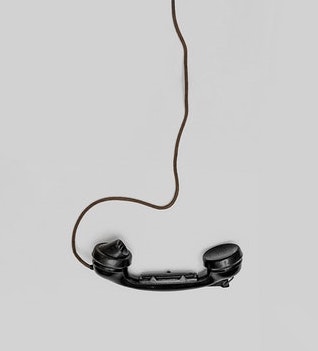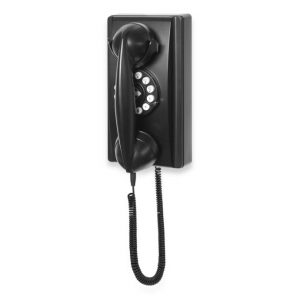My cell phone’s ringer sounds just like the black wall phone that hung in the kitchen of my childhood, the one I learned to dial by standing on a chair.
Phone Etiquette

When I was tall enough, I answered it the way we’d learned in third grade – from a textbook no less – and practiced in pairs.
“Hello, this is Deborah, who’s calling please?”
“Is your mother there?”
I was then supposed to ask, “Who shall I tell her is calling, please?” but without Mrs. Flanagan peering over her steel framed glasses with raised eyebrows to prompt me, I crumped at the prospect of questioning a grown-up and said, “Just a minute.” I left the receiver dangling on its cord while I ran to find Mom.
Caller ID
These days, if I don’t recognize the incoming number on my tiny screen, I tap, “Sorry, I can’t talk right now,” figuring that someone who has a legitimate reason to talk to me in real time will leave a message. The pollsters and shysters never do.
Language Lags Behind Technology

That we still call the gadgets we carry in our pockets and purses “phones” is as archaic as “dialing”; the dial was supplanted by touch tone long before cell phones, yet the verb persists, even as we tap a name or icon or picture to put a call through. These days, our ‘phones’ as we insist on calling them, link us to cyberspace – and to each other. They signal us with bells, dings, chimes and jazz, sounds that stimulate us the same way Pavlov trained his famous dogs; we behave as if we have no choice but to respond.
Ring! Twitch. Ring! Twitch.
Like lab rats, we respond by giving precedence to the bell over the people we’re conversing with face-to-face. And what do those of us abandoned in mid-sentence do about it? We pull out our own devices to see who’s texted or emailed in the past quarter hour, or we check social media. Even if there’s nothing new, checking makes us look busy, connected, and at least as important as the person we were speaking with before being interrupted in a manner that few, these days, consider rude.
Out of Service Bliss
Since the middle of May, I have spent weeks out of service, either because I was in a remote corner of the universe or by choice. First, I was at the bottom of the Grand Canyon, where there’s no signal. Then I was in rural New Hampshire, where, even when in signal, I chose to leave my phone off. This past week, I was on the coast of Maine where, in the space of seven days, I received over a hundred and fifty emails. I didn’t answer any of them – and my world did not come to an end.
During the long stretches out of service this summer, I’ve been blessed with better concentration. Without the neck-jerk reaction at the alarm of incoming messages, I’ve been able to pursue thoughts without interruption. What’s more, my shoulders have dropped at the expectation of interruption.
Don’t Throw That Phone Away!

I won’t toss my phone in the sea; it’s a necessary tool in modern life. I need it, for instance, to board a plane. But I don’t need it on my person at all times, nor do I need to hear it ring whenever someone else has a mind to interrupt me. I’m going to start treating my cell more like that phone that hung in the kitchen, and when we were four teenagers at home, my mother insisted we take off the hook while we sat down to dinner.
That was even before answering machines, when if the phone rang and you weren’t home, you didn’t even know there’d been calls you’d missed.
Nowadays, there’s voicemail.
So go ahead: call me. If I don’t answer, leave a message.
Thanks.
I am old enough I remember we had a party line. You had to be very respectful if you picked up to a conversation and not a dial tone.
It seems most younger people rather text then call these days. I do not see the advantage of a conversation spelt out in acronyms I can’t understand. But I suppose I am showing my age again!